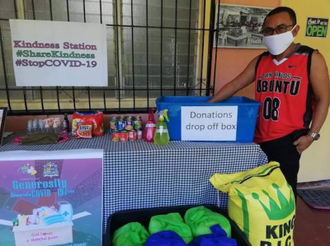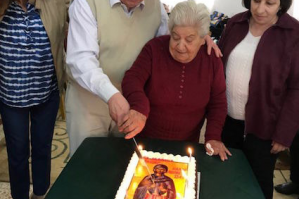Philippines: Caritas Kindness Stations during pandemic

Fr Edwin is Director of Caritas Philippines and Director of the National Secretariat for Social Action (NASSA).
The Philippine government on March 17, 2020 declared a State of Calamity throughout the country for the period of six months due to the COVID-19 global pandemic. An Enhanced Community Quarantine covering the entire Luzon Island was imposed until April 14, 2020, requiring mandatory home quarantine for everyone.
According to the national government, there are more than 100 million Filipinos greatly affected by the Enhanced Community Quarantine due to COVID-19. These are the factory workers, vendors, traffic aides, delivery men and women, public utility drivers, fast food chain crew, informal dwellers, janitors, street sweepers, construction workers, and many other vulnerable sectors whose lives literally stopped when the limitation in mobility and interaction was enforced, in the hope of stopping the spread of the virus.
The Independent think-tank Ibon Foundation estimates that we need at least PhP296.2 billion pesos a month to support various programs that will ensure the continuity of socio-economic activities and services, especially at community levels. Lack of funding is a problem, as well as governance capacity to address the overwhelming emergency.
We were not ready. No one was. All sectors in society have been tremendously affected by the COVID-19 pandemic The lockdown has practically prevented the holding of regular liturgical celebrations in the Church, even for Sundays and Holy Week. And it has also paralyzed the normal economic transactions throughout the country and even globally. At NASSA/Caritas Philippines, as the whole workforce is quarantined at home, we were practically immobilized and held incapable of doing our usual humanitarian response, or so we thought. But there was this undaunted desire to help the poorest, those who are most affected by the this catastrophe.
It all started in a chat group, wanting to help, and share the act of kindness: "I know we can do something to help the families needing assistance. Will you be willing to help set-up a Kindness Station?" Filipinos never lack generosity and the heart for service, and in every difficult situation, we always rise to the occasion. Only this time, any aid provided must be reciprocated with co-responsibility. Thus the idea of the Kindness Station is simple: take what you need, spare some for others, give what you can.
NASSA/Caritas Philippines, as a humanitarian organization, invited our network from the social action centres of the dioceses and our colleagues from the civil society organizations to mobilize our communities to prioritize the targets and reach out to the most needy. This is a concrete way to localize our humanitarian response. The idea of Caritas Kindness Station is to decentralize the humanitarian response - so that the communities themselves help the needy, and not through the usual top-to-bottom approach or the donor-to-beneficiaries framework of providing relief assistance.
So inspired by solidarity ideas from friends and colleagues, NASSA/Caritas Philippines adopted the initiative and turn it into a trailblazing national campaign: ALAY KAPWA SA PAMAYANAN: COMMUNITY CARITAS KINDNESS STATIONS.
The Caritas Kindness Stations, while fully adhering to the quarantine guidelines, especially on physical distancing and proper hygiene and sanitation practices, was rolled-out to the diocesan social action centers with:
One directive: decentralize giving and sharing by mobilizing parishes, community organizations and individuals. This is unlike the relief operations we are so used to doing in the past. Soon, resources from the government and aid organizations will run-out, aid will cease and our collection boxes will be emptied. But we will always have more than enough supply of people with generous hearts and selfless souls. We will always be doing the multiplication of loaves and fish.
One requirement: complement the efforts of our government by ensuring proper coordination, effective collaboration, and open communication, to maximize use of resources, and spread the delivery of services to as many families as possible, but always being mindful that we are doing this to uplift human dignity. This is our direct response to make real the Church's principles on common good, solidarity and subsidiarity.
One request: pray for one another. This is another extraordinary time when we are reminded that we cannot face the crisis on our own, thus we are called to remain true to our faith, and share its strength with each other. We have to manifest God's love through our own acts of kindness, generosity, compassion, mercy and empathy toward our neighbours. For it is only in prayer that we unite with the world, with nature, and with God.
The Community Caritas Kindness Stations therefore, which started online-turned-community-based charity movement in Sorsogon, is now being replicated in the following dioceses/communities: San Carlos City, Negros Occidental; Bacolod City, Negros Occidental; Gumaca, Quezon; Ilagan City, Isabela; Puerto Princesa City, Palawan; Naga City, Camarines Sur; Legazpi City, Albay; Marawi City, Lanao del Sur; Vigan, Ilocos Sur; Iba, Zambales; Kidapawan, Cotabato; Calamba, Laguna (Mary Help of Christians Parish); Loboc, Bohol. And the list is growing . . .
Religious congregations like the CICM Missionaries, Franciscans of Our Lady of Divine Providence in Isabela, Dominican Sisters and the Camillian Sisters have also followed the examples and are now running their own Caritas Kindness Stations.
There are other parallel initiatives. Caritas Manila, despite the lockdown, is doing a major fundraising and emergency response. There are parish initiatives to reach out to the street families, to the daily wage earners, and the poorest, to the most vulnerable members of the community. There was also the initiative to provide Safer Spaces for the Homeless, where schools and convents are being offered as temporary shelter for the homeless. To mention some: De La Salle University, College of St Benilde, St Scholastica, Paco Catholic School, Espiritu Santo Catholic School, Arnold Jansen Kalinga Center, among others. Religious congregations and parishes are also offering their schools to shelter the medical frontliners, like St Nino Parish in Tondo, St Anthony's Shrine in Sampaloc, St Mary's College (RVM), Convent of the Holy Spirit, Franciscans Missionaries of Mary in Pandacan, Archdiocesan Shrine of Nuetra Senora de Guia in Ermita, OFM Provincial House in Quezon City, and St John Bosco, Makati.
The Community Caritas Kindness Stations, amplifying empathy with the genuine sense of giving and sharing among and between us, started not with the Church hierarchy. Instead, it emanated from Catholics and Christians, teachers and professionals, public servants and lay leaders. It was seen, felt and experienced by mothers and children, vendors who can't sell, tricycle drivers who stopped taking passengers, construction workers who can't go to work, and daily minimum wage earners who can't earn even a penny.
With the Community Caritas Kindness Stations, we are creating ripples of hope: that in due time the pandemic crisis will end, that goodness will prevail, and that God will always be with us. In these very trying times, the Community Caritas Kindness Stations have put human faces to sincere kindness, compassion, and self-giving amid great need, panic and uncertainty.
The Kindness Stations are assuring us that #weareinthistogether. After all, #weareCaritas.


















